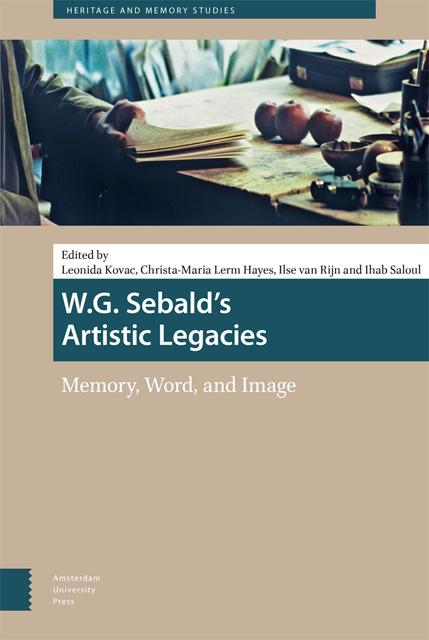3 - The Worlds of Eternal Present: The Quest for the Hidden Patterns of Baroque Thought in Sebald’s literature
Published online by Cambridge University Press: 26 October 2023
Summary
Abstract
Although the main topic of the conference is directed to the influence of Sebald’s interdiciplinary and highly hybrid work on contemporary artistic production, I would aim to present the other aspect of interdisciplinarity present in his work. It is the aspect the that looks backwards in time, and opens the different dimension for perceiving Sebald’s work. I would like to show how Sebald’s literature reflected the pronounced hybridity and polyvalence of an age as complex and calamitous as his own—the time of the Baroque. These concepts of multi-disciplinarity and hybridity were first epitomised in the Baroque age and stood prominently in the work of many artist, including the ouvre of one great, albeit invisible character of Sebald’s Rings of Saturn—Sir Thomas Browne. As usual to Sebald’s writing, Thomas Browne was present indirectly, through his writings (The Urn Burrial and Religio Medici) but even more through a prevailing sense of time that enveloped the entire book—the concept of eternal present. “The eternity has no distinction of tenses” wrote Thomas Browne, the notion that was to define Sebald’s perception of time where everything that was, lasts forever, where past eternally outlines our present. It was in the Baroque that such sense of the past “as an open category” was first introduced, a concept that would stand as one of the central concepts of Sebald’s literature.
Keywords: Sebald’s Artistic Production, Baroque, Eternal Present, Thomas Browne, Hybridity
I now think that the time will not pass away, that I can turn back and go behind it, and there I shall find everything as it once was, or more precisely I shall find that all moments in time have co-existed simultaneously, in which case none of what history tells us, is true.
—W.G. Sebald, AusterlitzIt was in the Baroque era that the West first fully began to explore the depths of time. While it continues to be a main preoccupation within Western culture, few contemporary writers engage with it as profoundly as in those first forays.
- Type
- Chapter
- Information
- W. G. Sebald's Artistic LegaciesMemory, Word, and Image, pp. 67 - 80Publisher: Amsterdam University PressPrint publication year: 2023



